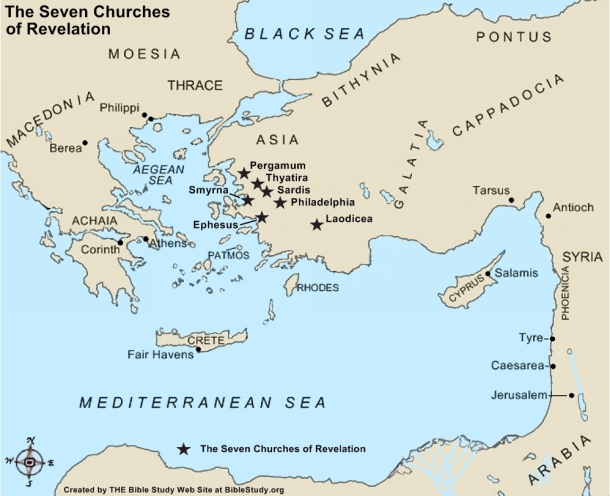Teaching the subject of the letters to the seven churches is always rewarding. There are some teachers who believe they are a progressive list of stages the church has passed through over time. I think it is clear that we have always had some of the things included in the list at every stage of the church’s history. What is clear is that the letters were written with a specific pattern in mind:
1) The “addressee”: Titles of the collaborating author with John (Jesus).
2) The encouragement based on Jesus’ personal knowledge of them.
3) The indictment or instruction based on Jesus’ knowledge of them.
4) The promise to them.
The attached chart is a favorite of my students, and is used when I take groups to Turkey to study the Bible lands in “The Life and Journeys of the Apostles”. Feel free to copy it if that will be helpful.
THE SEVEN CHURCHES OF REVELATION – (Chapter two)
Ephesus: “relax, permit, let go”
|
Smyrna: “crushed myrrh”(Izmir) |
Pergamum: “height, towering”(Bergama) |
Thyatira: “sacrifice, affliction”(Akhisar) |
|
Left first love |
Suffering |
Corrupt |
Sexual Sin |
|
1) Epistle to the Ephesians 2) Rev. 1:11, 2:11. 3) Acts 19:31 “Asiarchus” 4) Acts 19:41 Demetrius and the Silversmiths
|
1) Rev. 1:11; 2:8 2) Rev. 2:9 “suffering” 3) “synagogue of Satan” |
1) Rev. 1:11; 2:13 “throne of Satan” 2) 1 Tim. 4:8 “bodily exercise” |
1) Rev. 1:11; 2:18-29 2) Acts 16:14 “Lydia” 3) Acts 19:10 Paul known here while preaching at Ephesus; Apollos at Corinth. |
|
He who holds 7 stars and walks in midst of 7 lampstands (2:1)
|
First and Last: was dead, now living (2:8) |
He that has the sharp two- edged sword (Rev. 2:12; cp. Heb. 4:12) |
Son of God with eyes of flame and feet of fine brass |
|
I know product is practice of patience and purity; against Nicolaitines (2:3,6)
|
I know your persecution and poverty (poor rich church – 2:9) |
I know those who have held fast my name, not recanted. Antipas faithful martyr (2:13) |
I know your love, faith, service – increasing more and more (2:19)
|
|
Left first love: a “high place” from which you have fallen (2:4-5)
|
Don’t fear suffering, prison or martyrdom (Rev. 2:10) |
Have some in error of Balaam and Balac; others in error of Nicolaitines (2:14-15) |
Allowing Jezebel to commit spiritual adultery; refusing correction (2:10,23) |
|
Give “tree of life” to overcomer (cp. 1 Jn. 5:5)
|
Give “crown of life” to martyrs (2:10); they will live in second death |
I will come with sword to those in error (2:16); to overcomers I will give hidden manna (2:17) – <white acquittal stone> |
I will come and judge Jezebel and her children; to overcomer I give authority over nations (2:24-28) |
|
“Nicolaitines” may refer to followers of Nicolaus (Acts 6:5) who advicated sexual immorality or from “NIKAO”-one who lords or conquers, advocating a high clergy system.
|
“crown of life” the city had a ring of upper temples that looked like a crown from the harbor; “poverty”: the port city was known a lavishly wealthy place! |
Asklepion (hospital, cp. Dr. Luke); “Balaam and Balak” prophet themes |
Jezebel: cp. 1 Kings 16, 2 Kings 9; Trade guilds with wool and dying industry (cp. Acts 16:14) |
|
Stoic Religion
|
Fear vs. Faith |
Compromise to Grow |
Spiritual Adultery |
|
|
|
|
|
THE SEVEN CHURCHES OF REVELATION – (Chapter three)
Sardis: “those escaping or red ones”(Sart)
|
Philadelphia: “Brotherly love”(Alasehir) |
Laodicea: “Justice of the People”(Denizli, Ekhisar) |
|
Deadness |
Faithful |
Lukewarm |
|
Rev. 3:1-6
|
Rev. 3:7-13 |
|
|
He that has the seven spirits of God (Isa. 11) and seven stars (3:1)
|
He that is holy and true, holds key of David; opens and no man shuts (3:7)
|
The Amen, the faithful and true witness; the beginning of creation (3:14) |
|
A few not defiled (3:4)
|
Though few, yet you have kept word, and not denied My name (3:8) |
NONE |
|
Many are DEAD! Strengthen what lives still (3:2)
|
Hold on that no one will take away your crown (3:11; cp. 1 Cor. 9:24-27) |
|
|
|
|
|
|
Capture of Lydia from Croessus by Cyrus
|
Chief god Dionysius (wine) |
“poor, blind and naked”: industries were wool, salves and banking; wealthy under Roman rule (Col. 4:13-16)
|
|
Dead Faith
|
Faithful |
Indecisive |
|
|
|
|








